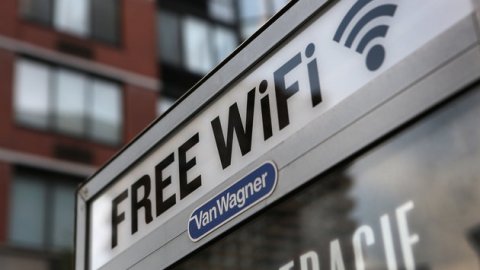New York City Is Converting Its Outdated Pay Phones into Free Wi-Fi Hotspots

New York City has officially put its ambitious LinkNYC plan into action, embarking on an eight-year project to convert the city’s rusty, old pay phones into shiny, new free Wi-Fi hotspots. Approximately 7,500 outdated telecom stations (and Colin Farrell plot devices) will be replaced under LinkNYC’s provisions. The new hotspot system is funded through digital advertising and will provide free Internet access to legions of locals and tourists alike.
The first unit of the LinkNYC pilot program was rolled out for testing last week at Fifth Street and Third Avenue.
The biggest reason these pay phones are being retrofitted into Wi-Fi hotspots? Tech disruption. The mobile phone completely disrupted the phone booth and landlines, seemingly making them obsolete overnight. In what other realms should we expect the next phase of tech disruption? Singularity University’s Vivek Wadhwa has the answer:
Each hotspot will provide free Internet access within a 150-foot radius to a speedy 1 Gbps network. Other infrastructural features include the addition of device-charging stations and the ability to make personal calls free of charge. The structures will be easily visible — each will tower over the crowds at nine feet tall, resembling a digital sci-fi obelisk of sorts. The terminals will also be fully ADA-compliant and include an emergency button to contact 911.
LinkNYC will no doubt serve as a test for the rollout of similar systems across the country. The Wi-Fi hotspots are dripping in civic appeal, and contracting with private enterprise allows the city to minimize risk and monetary investment. The project is not without its critics, who bring legitimate concerns about security and encryption, as well as the hazy details of New York’s deal with Qualcomm and other telecom companies attached to the project.
Still, the outlook for LinkNYC is exciting. We’ll have to check in on the project moving forward, but the system’s potential success could spur a wave of similar infrastructural investments in the future. Time will tell.
(TOP PHOTO: JOHN MOORE/GETTY IMAGES)
**
Robert Montenegro is a writer and dramaturg who regularly contributes to Big Think and Crooked Scoreboard. He lives in Washington DC and is a graduate of Loyola Marymount University in Los Angeles.
Twitter: @Monteneggroll. Website: robertmontenegro.com.





